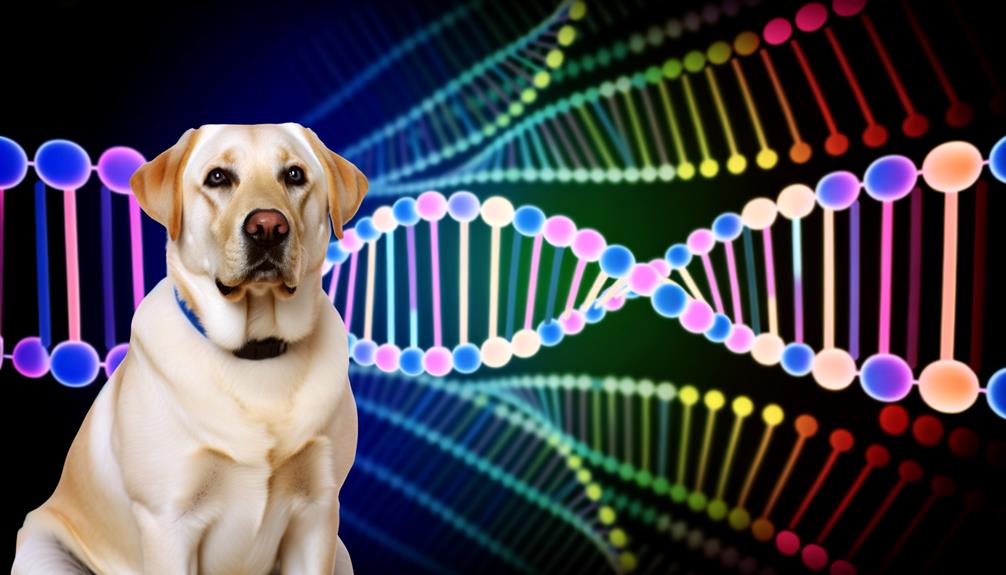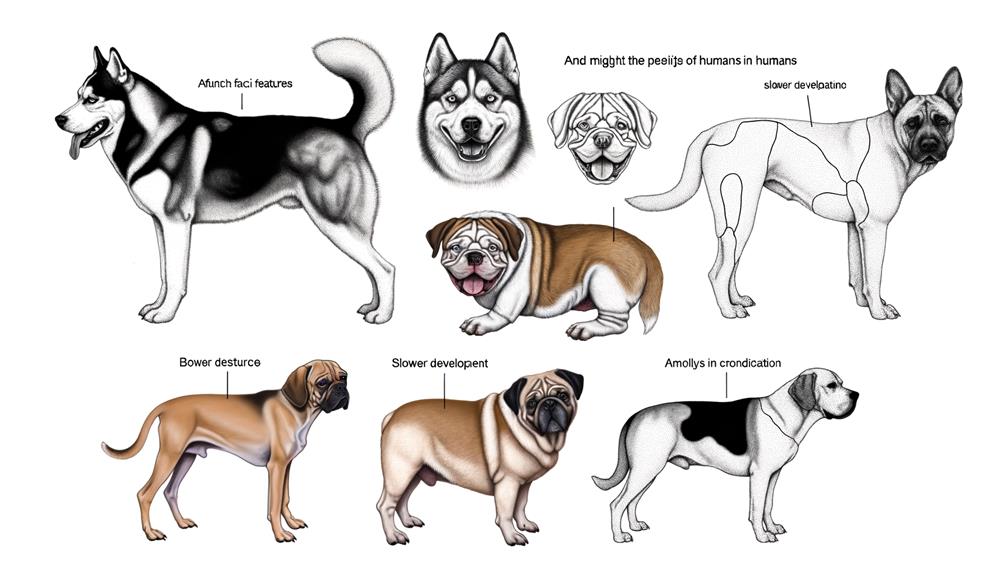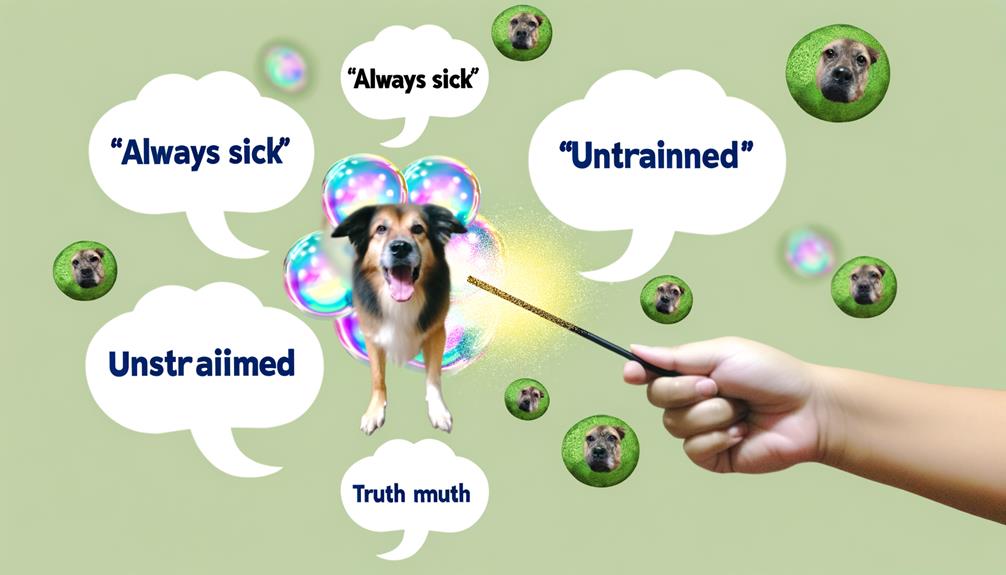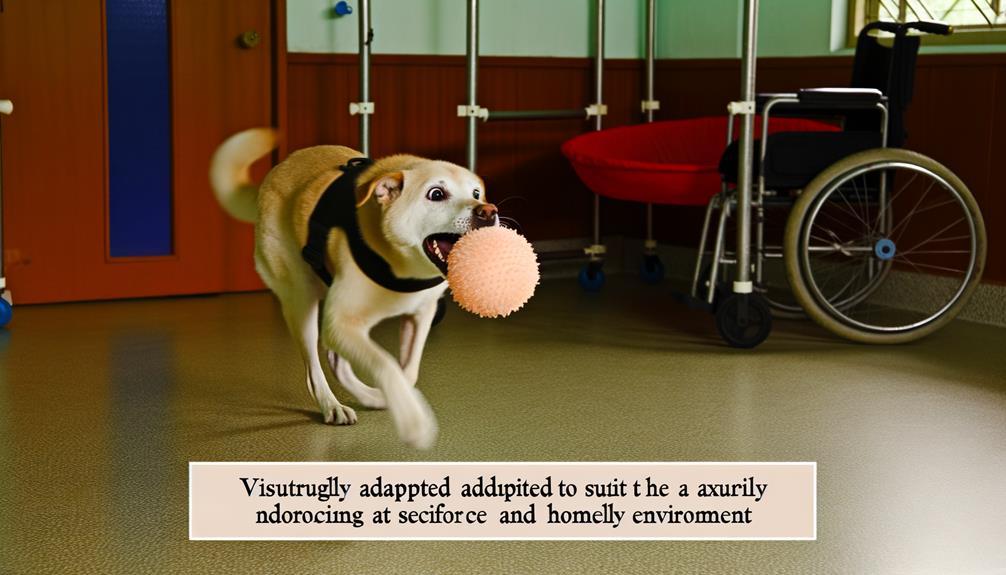You've probably heard of Down Syndrome in humans, but did you know it can also occur in dogs? It's a complicated and intriguing topic, with many misconceptions surrounding it. There's a world of information to discover, from understanding the genetic basis and identifying potential symptoms to the lifestyle modifications required for caring for a dog with special needs. However, the science isn't as straightforward as you might think. Stick around, as we're about to debunk some common myths and delve into the real-life stories of dogs with Down Syndrome.
Understanding Down Syndrome

To truly grasp the concept of Down syndrome in dogs, it's crucial to first understand what Down syndrome is in general. Down syndrome is a genetic disorder that occurs when an individual has an extra chromosome, specifically chromosome 21. This extra genetic material disrupts the normal development and functioning of the body, leading to a range of physical and cognitive traits.
Now, you might be wondering, how does Syndrome Awareness and Genetic Counseling fit into the picture? Well, Syndrome Awareness is all about understanding and recognizing these traits. It's about educating yourself and others about the condition, because knowledge is power. It's about breaking down stereotypes and fostering acceptance and inclusion for those with Down syndrome.
Genetic Counseling, on the other hand, is a service that provides information and support to families who've members with genetic disorders. It's a vital part of managing Down syndrome as it helps families understand the condition, what to expect, how to care for their loved one, and how to make informed decisions about their future. So, in understanding Down syndrome, both Syndrome Awareness and Genetic Counseling play a significant role.
Down Syndrome: Human Vs Canine

You're probably wondering how Down Syndrome in humans compares to that in dogs.
To help you understand, let's first look at what Down Syndrome means for humans.
Then, we'll explore what it might look like in our canine companions.
Understanding Down Syndrome
Let's first grasp what Down Syndrome is in humans before we delve into its existence in canines. This condition, you see, involves chromosomal anomalies. Typically, each person has 46 chromosomes. However, individuals with Down Syndrome have an extra copy of chromosome 21, meaning they've 47 chromosomes in total. This extra chromosome causes a variety of physical and intellectual challenges. Understanding this helps you appreciate the genetic diversity found in nature.
Now, when it comes to dogs, it's a bit more complex due to their genetic makeup. Dogs have 78 chromosomes, far more than humans. This fact, in combination with other factors, impacts how conditions like Down Syndrome manifest in canines. We'll explore this further in the next section.
Down Syndrome in Humans
While it's clear that humans with Down Syndrome carry an extra 21st chromosome, it's not as straightforward when it comes to dogs, due to their different genetic makeup. Human genetics provide a blueprint for understanding chromosomal disorders like Down Syndrome. In our species, this condition occurs when you have a third copy of chromosome 21, instead of the usual pair. This is why it's also known as Trisomy 21.
This additional chromosome alters the body and brain's development, leading to the physical features and intellectual disabilities associated with Down Syndrome. It's a complex intertwining of genetics and biology that defines how this condition manifests in humans.
As for dogs, the situation differs, and you'll learn why in the following section, 'Canine Down Syndrome Explained'.
Canine Down Syndrome Explained
In contrast to humans, dogs don't experience Down Syndrome in the same way, due to their unique genetic structure. Unlike humans, who've 23 pairs of chromosomes, dogs possess 39, making the occurrence of trisomy 21, the cause of Down Syndrome, less likely.
This doesn't mean, however, that dogs are immune from genetic disorders or disabilities. They can exhibit symptoms similar to Down Syndrome, such as congenital hypothyroidism, which can cause facial deformities and developmental delays.
You should beware of the syndrome stigma that surrounds these conditions, as it's outdated and harmful. Pet acceptance is essential, regardless of your dog's health status. After all, every pet deserves love and care, no matter their genetic makeup.
Genetic Basis of Canine Down Syndrome

Let's now turn our attention to the genetic basis of Canine Down Syndrome.
You might be curious about canine chromosomal abnormalities and how they relate to Down Syndrome in dogs.
We'll also touch on how one might go about diagnosing Canine Down Syndrome.
Understanding Canine Chromosomal Abnormalities
Diving into the genetic basis of Canine Down Syndrome reveals that it all boils down to canine chromosomal abnormalities. These chromosomal variations are the root cause of many genetic disorders, including Canine Down Syndrome.
Just like in humans, dogs have 39 pairs of chromosomes. These contain the genes which dictate everything from their coat color to their health. Abnormalities can occur when there's a change in the number or structure of these chromosomes. This might be a missing or extra chromosome, or a piece of one that's moved.
Such anomalies can lead to a range of health problems, impacting a dog's development, behavior, and overall wellbeing. Understanding these abnormalities is key to comprehending how genetic disorders like Canine Down Syndrome occur.
Down Syndrome in Dogs
Often, you might wonder about the genetic basis of Canine Down Syndrome, which, like many genetic disorders, is complex and deeply rooted in chromosomal abnormalities. This condition manifests through a series of Canine Behavioral Changes that can be both perplexing and concerning.
These changes, however, aren't just random. They're a result of the dog's body trying to cope with the extra genetic material in its cells. It's vital to keep in mind that every dog dealing with this condition will react differently.
Supportive Community Involvement plays a crucial role too. It's essential to connect with others who are navigating similar challenges. They can provide valuable insights, tips, and emotional support. Remember, you're not alone in this journey.
Diagnosing Canine Down Syndrome
To accurately diagnose Canine Down Syndrome, understanding its genetic basis is absolutely crucial. Similar to humans, dogs have chromosomes that may carry irregularities, potentially leading to Down Syndrome. However, dogs don't typically get diagnosed with this condition, as its existence in canines is still a topic of debate among scientists.
For a definitive diagnosis, genetic testing is often necessary. You'll need to undergo a veterinary consultation where your vet will guide you through the process. They may take a sample of your dog's blood or tissue for laboratory analysis. Remember, it's not easy to detect and the symptoms often mimic other conditions. So, don't jump to conclusions without the proper tests and consultation. Stay informed, and make sure you're providing the best care for your furry friend.
Identifying Potential Symptoms

While it's difficult to diagnose Down Syndrome in dogs, you can spot potential symptoms if you know what to look for. Symptom recognition is crucial in understanding canine behavior and ensuring your pet's wellbeing.
- Physical abnormalities: Dogs with Down Syndrome often have distinct physical characteristics. They might've broad, flat faces, short necks, or unusually small or oddly shaped ears. Their eyes might be set far apart or slant upwards, and their tongues can appear larger than normal.
- Slow growth: Puppies with Down Syndrome might grow slower than their siblings. They might also have difficulties with motor skills, seeming clumsy or uncoordinated.
- Behavioral changes: These dogs may exhibit unusual behaviors. They may be excessively passive or inactive, show signs of confusion, or have difficulty learning commands or routines.
- Health issues: They often suffer from health problems such as heart disease, poor vision, hearing loss, or thyroid issues. Regular vet check-ups are essential to monitor these conditions.
Common Misconceptions Debunked

Now that you're familiar with the potential symptoms, let's debunk some common misconceptions about Down Syndrome in dogs. The biggest misunderstanding is that dogs can have Down Syndrome just like humans. In reality, they can't have it in the same way as it's a human-specific chromosomal condition. Dogs can have conditions with similar symptoms, but it's not Down Syndrome.
The 'Syndrome Stigma' is another notable misconception. You might believe that dogs with similar symptoms are lesser or defective in some way. However, these dogs are just as capable of giving love and companionship as any other dog. They might need a little more care and patience, but they're not less worthy of love or adoption.
The lack of 'Public Awareness' is another problem. Most people aren't aware that dogs can even exhibit symptoms similar to Down Syndrome. This lack of knowledge can lead to misconceptions and misinformation spreading. It's important to educate yourself and others about these conditions and the dogs they affect.
Diagnosis Process and Challenges

You might be wondering how Down syndrome is diagnosed in dogs and what challenges may arise during this process. Managing health-related issues can be tough, and it's equally important to take into account the emotional impact.
Let's discuss how you can cope with these challenges and ensure your pet's wellbeing.
Understanding Down Syndrome Diagnosis
Diagnosing Down syndrome in dogs presents unique challenges and requires a careful, detailed process. You must understand that there are several syndrome misconceptions prevalent, which may lead to inaccurate diagnoses. Canine therapy can play a pivotal role in managing symptoms, but a correct diagnosis is essential beforehand.
- Be patient: It's a meticulous process that involves several tests.
- Know the signs: You should understand the typical symptoms such as physical abnormalities and developmental delays.
- Don't jump to conclusions: Given the syndrome misconceptions, it's easy to mistake Down syndrome for other conditions.
- Seek expert help: Consult a veterinary geneticist for a definitive diagnosis.
Managing Health-related Challenges
Managing your dog's health-related challenges begins with understanding the complex process and hurdles involved in diagnosing Down syndrome. Regular Veterinary consultations play a key role. The vet will assess your pet, conduct necessary tests, and monitor the condition's progression. Diagnosing Down syndrome in dogs isn't straightforward due to its rarity and the overlap of symptoms with other conditions. It's not a one-off process; ongoing consultations are crucial.
Specialized nutrition is another significant aspect of managing these health challenges. Your vet may recommend a specific diet tailored to your dog's needs. It's not just about feeding your pet; it's about providing the right nutrients to manage the symptoms and improve the quality of your pet's life. Remember, every small step makes a big difference.
Emotional Impact and Coping
Navigating the diagnosis process and facing the challenges of your dog's Down syndrome can be an emotionally taxing journey. It's crucial to develop emotional resilience and efficient coping mechanisms to help you through this period.
- Seek support: Turn to friends, family, or online communities who understand your situation.
- Educate yourself: Learn about Down syndrome in dogs, the better you understand, the easier it'll be to manage.
- Self-care: Don't neglect your own needs. Taking care of yourself helps you take better care of your dog.
- Professional help: Consider seeking help from a counselor or therapist.
Caring for a Dog With Special Needs

Understanding and addressing the unique needs of a dog with Down Syndrome can transform both your lives, creating a bond filled with love and mutual respect. You'll need to focus on two key areas: special needs nutrition and the use of canine mobility aids.
Special needs nutrition is crucial for your furry friend. You've got to be mindful of what you're feeding them. They'll likely need a diet that's easy to digest and packed with nutrients to support their overall health. Consult with a vet to create a dietary plan tailored to your dog's specific needs. Don't be afraid to ask questions. It's important to understand what your dog needs and why.
Canine mobility aids can also be a game changer. Dogs with Down Syndrome often struggle with mobility issues. Dog wheelchairs, harnesses, or ramps can make a big difference in their quality of life. They can help your dog move around more easily, making them more independent. Again, it's best to consult with a professional to find the right aid for your dog.
Caring for a special needs dog might be challenging, but it's also incredibly rewarding.
Lifestyle Modifications for Affected Dogs

Adapting your dog's lifestyle to accommodate their condition is a crucial step you'll need to take. As your dog's needs change, you'll have to ensure they're still getting the most out of life despite their limitations.
One of the key areas you'll need to focus on is Nutritional Requirements. Dogs with Down Syndrome may have different dietary needs compared to other dogs. They may need a diet that's low in fat and high in fiber, with a good balance of protein.
- Consult a vet: They can provide a detailed dietary plan fitting for your dog's needs.
- Measure meals: Avoid overfeeding as weight gain can further complicate your dog's health.
- Offer a balanced diet: Ensure it contains all the necessary vitamins and minerals.
- Monitor their weight: Keep a close eye on their weight and adjust their food intake accordingly.
Another essential aspect is Specialized Training. These dogs may have a harder time learning commands or behaviors, so patience is key. Use positive reinforcement techniques and keep training sessions short and fun. With time and patience, you'll be able to help your dog adjust to their new lifestyle.
Therapeutic Interventions and Support

In addition to modifying your dog's diet and training, you'll also need to explore various therapeutic interventions and support options to help manage their condition effectively. One of these interventions could be the use of adaptive toys. These toys are designed to stimulate your dog mentally and physically, which can be beneficial for dogs with Down Syndrome as it can improve their coordination and cognitive skills.
Special training is another crucial aspect of therapeutic intervention. This training should be tailored to meet your dog's unique needs and help them adapt to their environment more effectively. You might need to work with a professional dog trainer who's experience in handling dogs with special needs. They can provide you with the necessary skills and knowledge to handle your dog's behavior and improve their quality of life.
Support groups for owners of dogs with Down Syndrome can also be an excellent resource. These groups can provide you with advice, share experiences, and offer emotional support. You're not alone in this journey, and by interacting with others who are facing the same challenges, you'll gain deeper insight into how you can better care for your dog.
Real-Life Stories of Dogs With Down Syndrome

Ever heard inspiring tales of dogs with Down Syndrome who've overcome their challenges with the help of their dedicated owners? Let's dive into a few heartwarming stories of such canine companionship and resilience.
- Max, the Golden Retriever: Max was born with Down Syndrome but that didn't stop his owner from providing him with love and special training. Despite his condition, Max became a social media sensation, teaching people about acceptance and love.
- Buddy, the Poodle: Buddy was diagnosed early, and his owners took it upon themselves to give him special training. Today, Buddy is a confident, playful dog who loves his family unconditionally.
- Milo, the Labrador: Milo's owners didn't let his condition define him. They trained him to adapt to his environment, and Milo has grown into a spirited, affectionate companion.
- Lucy, the Shih Tzu: Lucy's owners treated her with utmost care, love, and patience. They provided her with special training, and today, Lucy is a happy, lively dog who brightens everyone's day.
Each tale reiterates that dogs with Down Syndrome, despite their challenges, can lead fulfilling lives with love, care, and appropriate training. These stories are testament to the power of canine companionship and resilience.
Frequently Asked Questions
Can a Dog With Down Syndrome Live a Normal Life Span?
Yes, with a proper Down Syndrome diet and monitoring of Syndrome symptoms, you can ensure a near normal lifespan. It's crucial to provide special care, regular vet check-ups, and a lot of love.
Do Certain Breeds of Dogs Have a Higher Risk of Down Syndrome?
You're wondering if certain breeds carry a higher risk for genetic influences leading to syndrome symptoms. Currently, there's no definitive research showing specific breeds are more susceptible than others. It's a complex issue needing more study.
Can Down Syndrome in Dogs Be Prevented or Avoided?
You can't entirely prevent genetic conditions, but genetic testing and prenatal care may help identify potential issues. However, it's impossible to completely avoid such conditions, as they're often a result of genetic inheritance.
How Does Down Syndrome Affect a Dogs Interaction With Other Pets?
When considering how a condition impacts interactions, it's crucial to consider emotional impact and sensory challenges. Your pet may struggle with understanding social cues, leading to potential difficulties when interacting with other pets.
Are There Specialized Training Methods for Dogs With Down Syndrome?
Yes, you'll find specialized training methods considering Down Syndrome symptoms. It's crucial to consult veterinary care options for personalized techniques that cater to their unique learning and interaction abilities. Patience and consistency are key.
Conclusion
Caring for a dog with Down Syndrome isn't easy, but it's rewarding. It requires understanding, commitment, and love.
You'll need to make lifestyle adjustments, consult with your vet regularly, and provide a tailored diet. With patience and special training, your unique companion can lead a fulfilling life.
Remember, debunking misconceptions and learning about your dog's genetic condition can make a world of difference. You're not just a pet owner, you're their lifeline and biggest supporter.







